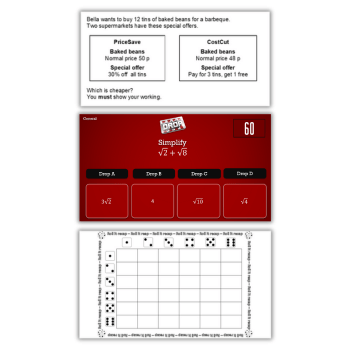Maths teachers – Could colleagues benefit from your knowledge?

Ama Dickson explains how your maths department’s expertise could be channelled into CPD for co-workers in other subjects…

- by Ama Dickson

Maths teachers will frequently encourage their students to work together and share their ideas. But how often do teachers themselves collaborate in similar ways across departments?
Professional learning communities within a school context can build trust amongst staff, creating safe, open environments in which colleagues are able to exchange advice.
These kinds of communities help to develop a shared sense of responsibility. They encourage teachers to fully participate in decision making.
Efficiency gains
These communities can come into their own when you put goals in place to improve specific aspects of one’s practice. According to figures from the DfE, we can class some 52% of UK adults as having low attainment in numeracy.
Given the importance of numeracy across various areas of a teacher’s work routine, it may therefore be useful for members of a school’s maths department to deliver CPD aimed at improving those everyday, practical maths skills.
That might include understanding percentages, for example; the ability to identify a good deal and general budgeting calculations.
Procurement is, after all, a shared task that all department leads will likely have to undertake at some point. The knowledge informing those purchasing decisions can be just as important when junior teaching staff are sourcing supplies and negotiating terms.
Appropriate CPD delivered by maths teachers could thus potentially help different departments in your school operate more efficiently and cost-effectively
Numerically challenged
It’s worth bearing in mind how much more complex and difficult the process of budgeting in schools has become.
It used to be that teaching staff only had to decide how many textbooks and what items of equipment to purchase. Their considerations now extend to what online subscriptions their class might need, and how many of their students might require additional support.
Managing money, calculating costs, distributing funds and measuring impact accurately all involve the application of maths skills. Your school’s maths teachers are well-placed to help develop these.
Maths teachers can assist their colleagues in other ways, too. One hugely important skill teachers now need to have is being able to quickly and reliably analyse large volumes of data. You might generate this data from student assessments, or attendance figures that you track over time.
Trending
Then there’s the need to calculate the dimensions of displays, prepare quantities of materials for certain lesson activities and the estimations involved in planning offsite trips.
Offering maths CPD for teacher colleagues could boost understanding of the mathematical processes involved in all of those responsibilities. This paves the way for improvements to be made. This could make a crucial difference when it comes to, say, marks and percentages between grade boundaries.
Cross-curricular value
There could also be some cross-curricular value to be had from helping to improve colleagues’ maths skills.
Perhaps there are more reliable, less time-consuming ways of plotting coordinates in geography, figuring out the proportions required for recipes in food technology or making the data calculations needed to reach conclusions in science.
Who knows – that 3D objects drawing lesson in art may well benefit from some discussion around basic geometrical concepts.
All students will experience maths in a wide range of different ways across the totality of their school experience. So why not start a conversation and talk about this more openly?
Effective collaboration between teachers can ensure that students’ experience of maths is consistent, and discussed using a shared language. Approaching certain mathematical concepts in a more holistic, even cross-curricular way can only serve to further deepen students’ understanding.
It’s been reported that more than 8 million adults possess numeracy skills below those expected of a 9-year-old. The government has recognised how serious the problem is, hence the existence of organisations and specific programmes aimed at reducing that number – and maths teachers can play a role as well.
By equipping your school colleagues with practical, day-to-day maths skills,
you won’t just be helping them – you’ll also be contributing in a meaningful way to the futures of the students they teach.
Ama Dickson is a maths teacher, regular contributor to Collins’ series of maths revision guides and posts maths instruction videos to TikTok as @mathscrunch










